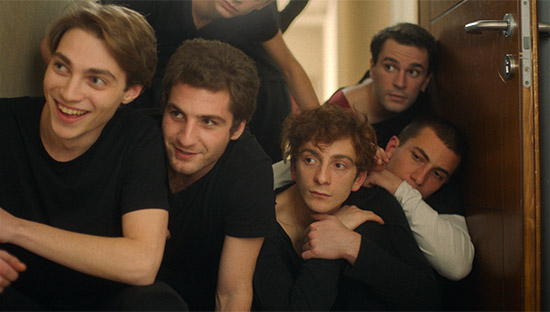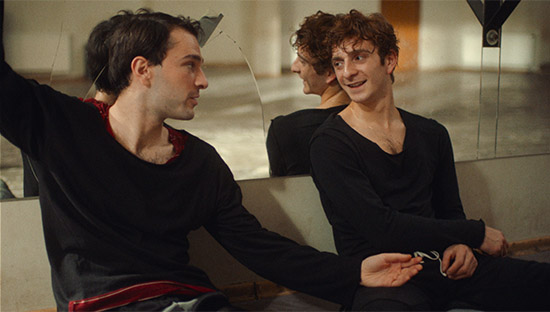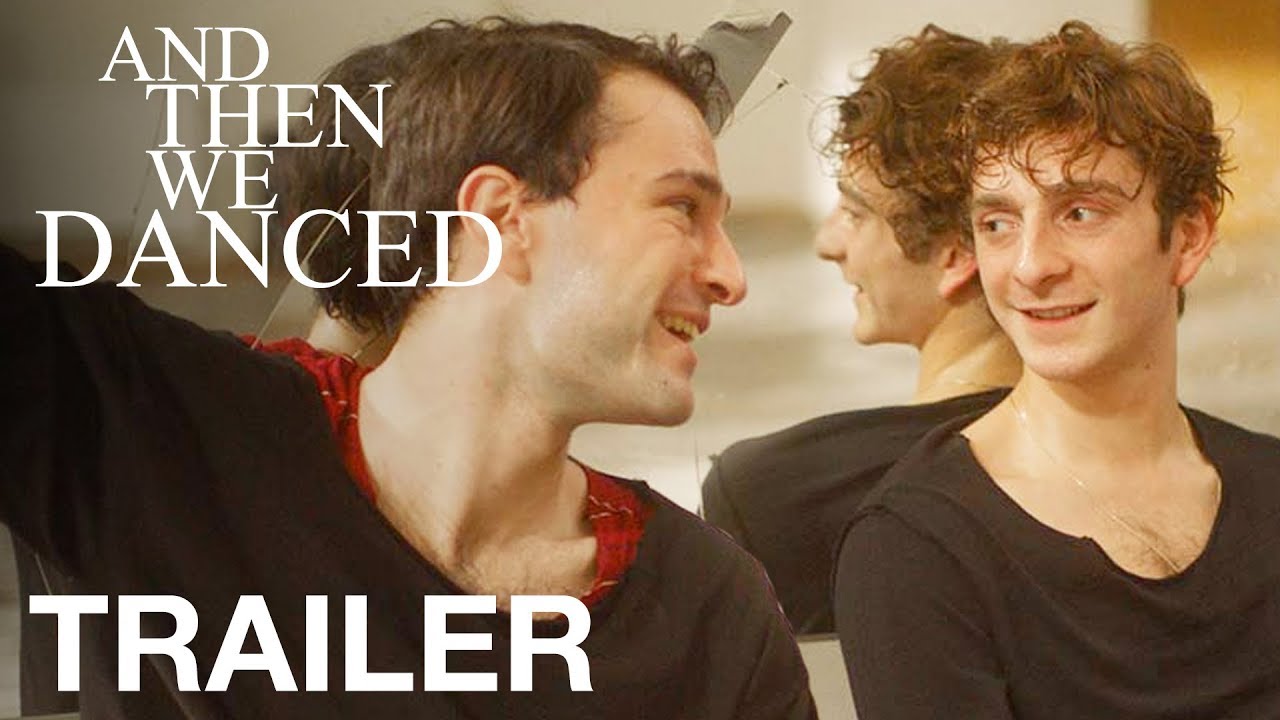“I am weak for folk dance, all folk dance, but there is something so cinematic about Georgian dance.” Levan Akin means this wholeheartedly. The filmmaker’s coming-of-age film is set under the watchful eyes of the conservative values of Tbilisi, Georgia, as Merab (Levan Gelbakhiani) dances his heart out for a place in the Georgian National Ensemble. However, competitive spirit cannot overpower the infatuation he has for his main rival, Irakli (Bachi Valishvili). And Then We Danced wields an emotionally earnest narrative that captures the intimacy of dance and the heart of Georgian tradition.
May 2019 marked the world premiere of And Then We Danced at the Cannes Film Festival. Yet the film’s roots were planted six years earlier, in 2013, when Georgian activists attempting to observe the International Day Against Homophobia, Transphobia and Biphobia were met with hostility and violence. It was this event that prompted Akin’s interest that laid the foundations of And Then We Danced. The Swedish director is of Georgian descent, something he believes helped him navigate the cultural space of this film. With Akin at the helm, the pertinent and passionate narrative is guided in a direction that, crucially, allows hope and ownership to belong to the youth of Georgia.
Georgia is one of the few post-Soviet countries that has introduced legalisation intended to protect individuals from discrimination based on sexual identity. For example, an amendment to Article 53 of the Criminal Code of Georgia specifies the principles of sentencing cannot be swayed by bias of sexual orientation or gender identity. However, this does not quite equate to peace and safety for those deemed protected. And Then We Danced harnesses this cultural context in its heartstring-tugging presentation of cautious romance. In a silent language of gestures, Merab and Irakli communicate with glances, touches and a palpable sense of desire on the dancefloor. Unable to be publically expressive, their infatuation is confined to secrecy.
I spoke to Giorgi Tabagari, co-founder and director of Tbilisi Pride and queer activist, about his experience of LGBTQI spaces and visibility in Georgia. “For the past five years or so, the underground scene flourished in Tbilisi and it still continues to empower young LGBTQI persons, but it’s time to get to the daylight now. We need to get out of the underground and be more visible.” This statement is very much a reflection of how And Then We Danced frames Merab’s queerness: concealed by day, expressed by night. The young man wrestles with this adverse situation, closeted and dealing with the pressure of unlocking success. Akin astutely lingers in moments of quiet self-realisation, revelling in the emotionally stirring hopefulness of Merab’s endeavour.
For Georgia’s LGBTQI community, the events of the 2013 Tbilisi Pride marked a step backwards. A moment that was intended to unite, instead, became an event that exposed the polarising stances of Georgian citizens. As Giorgi Tabagari frames it, “LGBTQI rights became a political issue and served as a litmus test for the government of Georgia. Unfortunately, the government has failed the democracy test, as they were unable to protect us, or deliberately conceded with radical groups and the Orthodox Church.” And Then We Danced is not naive about this context. Merab must forge choreography for his own life and future, Akin provides the young man with time to rehearse and daydream while he is embedded within a culture he feels isolated by. Retreating from the exclusion, Merab’s home is his safe haven. Yet, questions from his family and issues of financial security plague these four walls.

The intergenerational inclusion nestled within the film was something Akin was acutely conscious of. “There is a great divide in Georgia between the younger generation and their parents and elders,” the director explains. “Two different worlds, side by side.” It is this complex relationship with his environment that prevents Merab having a smooth coming-out. The trepidation of dealing with this subject in Georgia is illustrated by Akin’s team’s experience of creating this film, “We had to make up an alternate film plot to the one we were shooting to tell people, [and] we also had bodyguards on set.” The apprehension did not stop the crew, nor does it stop Merab’s infatuation. It also hasn’t stopped Tbilisi activists who took to the streets this year in what was, monumentally, the first LGBT Pride rally in Tbilisi.
A reclamation of identity is precisely the tool used to incorporate dance into the film. This self-expression, on an individual level, is imperative to Merab’s life and growth. Dance, additionally nightlife culture, is a lifeline for the LGBTQI community. Gay bars have been an integral hub for growth. Coming to life when the rest of the city is sleeping, LGBTQI communities took shape in these spaces. Tabagari shares this sentiment in relation to Georgia: “The club scene and dancefloors provided safer spaces to us.” It is Bassiani night club where Merab is able to find freedom in his movements, dancing with a new lease of liberation. The beat of this music sounds unlike the drum that echoes in his dance training. Strobe lights illuminate a new side of Merab as his limbs are lost to a joyous rhythm. A liberating scene in the film plays out to Kite’s ‘Jonny Boy’, an anthem of pride and a moment of euphoria.
In another blissful moment of self-expression, bathed in golden light, Merab dances to Robyn’s ‘Honey’ with a papakha perched atop his curls. Akin’s camera glides through this scene, demonstrating both an affectionate tenderness and a sensual framing of Merab’s body. Here, his movements are fluid as relaxed muscles move with a lustful energy. Under Irakli’s gaze, Merab places a spell on the man, hypnotising him with graceful movements as the lyrics croon. But Merab does not get to stay in these freeing headspaces for long, brought back down to earth as his dance instructor reminds him, “Georgian dance isn’t just about achieving perfection. It’s the spirit of our nation.” Indeed, this tradition is drilled into Merab. The dedication to his craft is tested as he’s told to adjust his posture and straighten his limbs. When words are not able to be spoken, dance enables Merab to form his own artistry, and his very existence creates an interruption to the traditional masculinity that occupies these floors.
“Visibility comes first for us, and this is how we envisage changes in this country.” Tabagari remains optimistic for the future of LGBTQI people in Georgia. “And Then We Danced plays a huge role in this struggle for rights and acceptance”, he says. “Movies like these can change the mindset of society, and I am looking forward to observing this process.” And Then We Danced speaks, and listens to the people it represents, indicating that visibility is an ongoing battle for acceptance of LGBTQI people in Georgia. Huge steps forward are being taken, helping empower the youth of Georgia to continue this need for acceptance. And Then We Danced offers more than a mere representation of LGBTQI individuals just being on the screen. Akin’s remarkable film is a letter of love addressed to Tbilisi, a reclamation of tradition for Georgian youth, and a call for the world to take notice.



